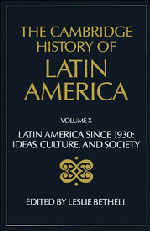Book contents
- Frontmatter
- 1 The multiverse of Latin American identity, c. 1920–c. 1970
- 2 Latin American narrative since c. 1920
- 3 Latin American poetry, c. 1920–1950
- 4 Latin American poetry since 1950
- 5 Indigenous literatures and cultures in twentieth-century Latin America
- 6 Latin American music, c. 1920—c. 1980
- 7 Latin American architecture, c. 1920–c. 1980
- 8 Latin American art since c. 1920
- 9 Latin American cinema
- 10 Latin American broadcasting
- Bibliographical essays
Bibliographical essays
Published online by Cambridge University Press: 28 March 2008
- Frontmatter
- 1 The multiverse of Latin American identity, c. 1920–c. 1970
- 2 Latin American narrative since c. 1920
- 3 Latin American poetry, c. 1920–1950
- 4 Latin American poetry since 1950
- 5 Indigenous literatures and cultures in twentieth-century Latin America
- 6 Latin American music, c. 1920—c. 1980
- 7 Latin American architecture, c. 1920–c. 1980
- 8 Latin American art since c. 1920
- 9 Latin American cinema
- 10 Latin American broadcasting
- Bibliographical essays
Summary
the multiverse of latin american identity, c. 1920 — c. 1970
A deeply imaginative reflection on the character of cultural expression in the Americas, presented by historical eras, is La expresión amerkana by the noted Cuban writer Jose Lezama Lima, first published in Havana in 1957. The sole critical edition is the Portuguese version, A expressāo amerkana (Sao Paulo, 1988), translated with a highly competent introduction and notes by Irlemar Chiampi. In his essays ’Visión de América’ and ’Conciencia e identidade de America’ in La novela latinoamerkana en visperas de un nuevo siglo (Mexico, D.F., 1981), 59-158, Alejo Carpentier addressed continental Americanism. Leopoldo Zea expands the barbarism-civilization theme to global proportions in Discurso desde la marginación y la barbarie (Barcelona, 1988). See also his Filosofia de la bistoria amerkana (Mexico, D.F., 1978). The role of intellectuals is examined in Juan F. Marsal (ed.), El intelectual latinoamerkano (Buenos Aires, 1970).
Studies of Latin American thought include two classics by the Spanish philosopher Jose Gaos, El pensamiento hispanoamericano (Mexico, D.F., 1944) and Pensamiento de lengua española (Mexico, D.F., 1945). Gaos’s Mexican disciple Leopoldo Zea produced a volume which, although controversial, remains seminal for the nineteenth century: The Latin-American Mind, trans. J. H. Abbott and L. Dunham (Norman, Okla., 1963). See also Harold Eugene Davis, Latin American Thought: A Historical Introduction, 2nd ed. (New York, 1974); and W. Rex Crawford, A Century of Latin- American Thought, rev. ed. (New York, 1966).
- Type
- Chapter
- Information
- The Cambridge History of Latin America , pp. 569 - 622Publisher: Cambridge University PressPrint publication year: 1995

